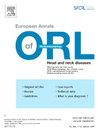唾液腺癌(不包括腺样囊性癌)的全身治疗:REFCOR通过正式共识方法推荐。
IF 1.9
4区 医学
Q2 OTORHINOLARYNGOLOGY
European Annals of Otorhinolaryngology-Head and Neck Diseases
Pub Date : 2024-09-01
DOI:10.1016/j.anorl.2023.11.004
引用次数: 0
摘要
目的:根据临床情况,确定涎腺癌(不包括腺样囊性癌)全身性药物治疗的指征。材料和方法:法国罕见头颈部肿瘤网络(REFCOR)成立了一个指导小组,起草了Medline上发表的文献的叙述性综述,并提出了建议。然后,根据正式的共识方法,由一个评级小组评估对建议的遵守程度。结果:唾液腺癌是罕见的,目前没有足够的证据表明在局部阶段化疗。在转移期,最初的管理可以基于对惰性疾病的监测阶段。一些组织学亚型(唾液管癌和腺癌)更具侵袭性,需要从一开始就进行全身治疗。为了指导全身治疗,建议进行免疫组织化学和分子生物学分析(HER2和雄激素受体的过表达,NTRK融合,下一代测序)。结论:唾液腺癌是一种罕见的肿瘤,目前有效的治疗方法很少。因此,建议将患者纳入临床试验。本文章由计算机程序翻译,如有差异,请以英文原文为准。
Systemic therapies for salivary gland carcinoma (excluding adenoid cystic carcinoma): REFCOR recommendations by the formal consensus method
Objective
To determine the therapeutic indications for systemic medical treatment in the management of salivary gland carcinoma (excluding adenoid cystic carcinoma) according to the clinical situation.
Materials and methods
The French Network of Rare Head and Neck Tumors (REFCOR) formed a steering group who drafted a narrative review of the literature published on Medline and proposed recommendations. The level of adherence to the recommendations was then assessed by a rating group, according to the formal consensus method.
Results
Salivary gland carcinoma is rare and there is currently insufficient evidence to indicate chemotherapy at the localized stage. At the metastatic stage, initial management can be based on a phase of monitoring for indolent disease. Some histological subtypes (salivary duct carcinoma and adenocarcinoma) are more aggressive and require systemic treatment from the outset. To guide systemic treatment, it is recommended to perform immunohistochemistry and molecular biology analyses (overexpression of HER2 and androgen receptors, NTRK fusion, next-generation sequencing).
Conclusion
Salivary gland carcinoma is a rare tumor for which there are currently few effective medical treatments. It is therefore recommended to include patients in clinical trials.
求助全文
通过发布文献求助,成功后即可免费获取论文全文。
去求助
来源期刊

European Annals of Otorhinolaryngology-Head and Neck Diseases
OTORHINOLARYNGOLOGY-
CiteScore
3.70
自引率
28.00%
发文量
97
审稿时长
12 days
期刊介绍:
European Annals of Oto-rhino-laryngology, Head and Neck diseases heir of one of the oldest otorhinolaryngology journals in Europe is the official organ of the French Society of Otorhinolaryngology (SFORL) and the the International Francophone Society of Otorhinolaryngology (SIFORL). Today six annual issues provide original peer reviewed clinical and research articles, epidemiological studies, new methodological clinical approaches and review articles giving most up-to-date insights in all areas of otology, laryngology rhinology, head and neck surgery. The European Annals also publish the SFORL guidelines and recommendations.The journal is a unique two-armed publication: the European Annals (ANORL) is an English language well referenced online journal (e-only) whereas the Annales Françaises d’ORL (AFORL), mail-order paper and online edition in French language are aimed at the French-speaking community. French language teams must submit their articles in French to the AFORL site.
Federating journal in its field, the European Annals has an Editorial board of experts with international reputation that allow to make an important contribution to communication on new research data and clinical practice by publishing high-quality articles.
 求助内容:
求助内容: 应助结果提醒方式:
应助结果提醒方式:


